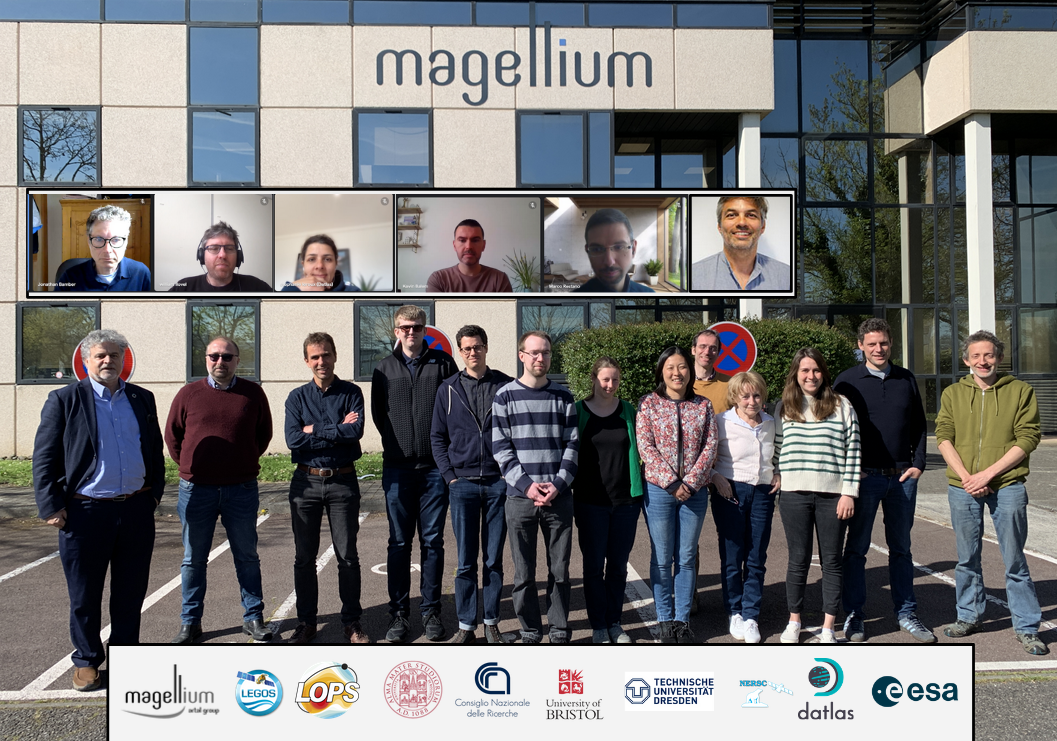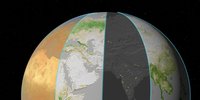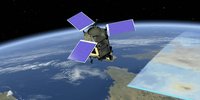Sea level is one of the most prominent indicators of climate change. It integrates changes of several components of the climate system in response to anthropogenic forcing as well as natural forcing factors related to natural sources and internal climate variability.
Present-day global mean sea level rise primarily reflects ocean warming (through thermal expansion of sea waters) and land ice melt. Changes in land storage constitute an additional contribution. As a primary objective of the ESA CCI programme was to reduce current uncertainties of sea level change and its individual components, better closure of the sea level budget should now be possible. This will improve our understanding of processes involved in causing global mean sea level rise and its regional variability, and further help to improve models used for projections of future climate changes.
Closure of the sea level budget implies that we have:
ΔSL(t) = ΔMOcean(t) + ΔSSL(t)
where ΔSL(t) is time-variable sea level, ΔMOcean(t) is time variable ocean mass component, ΔSSL(t) is steric sea level components (effect of the depth integrated change in sea water density due to ocean temperature and salinity variations).
Water mass conservation in the climate system implies closure of the ocean mass budget:
ΔMOcean (t) = [ ΔMGlaciers(t) + ΔMice sheets(t) + ΔMLWS(t) + ΔMAtm(t) + missing mass terms ]
where the ΔM(t) terms in the right hand side refer to glaciers and ice sheets mass balances, changes in land water storage (LWS, including seasonal snow cover), and atmospheric water vapour.
Studying the sea level budget and the ocean mass budget with accurate climate records will bring major scientific benefits – adding confidence to satellite-based assessments of climate change, shedding light on missing or poorly known processes such as land hydrology that remain a challenge for Earth Observation, or heat uptake by the deep ocean. This will allow the key processes affecting sea level rise to be precisely quantified, leading to more informed model projections. Together with extreme events like storm surges and tropical cyclones, regional/local sea level changes represent a major threat in low-lying, highly populated coastal regions of the world, each of which affects coastal planning. The project is therefore a timely opportunity to add societal value and visibility to the CCI, allowing it to form the backbone of a milestone contribution to climate science.
This project intends to analyse in an integrative context recent results obtained by the ESA CCI programme for the sea level, glaciers and ice sheets Essential Climate Variables (ECV), with additional account for assessments of the ocean thermal expansion component which utilise the CCI Sea Surface Temperature ECV. Among other objectives, an important task will consist of assessing the quality of the CCI products involved in the sea level budget.
The first phase of this project covered the precise altimetry era (starting in 1993) with a special focus given to the period 2003/2005 to 2015, coinciding with the availability of GRACE space gravimetry data and Argo drifter data.
The new project phase (SBLC_cci+) aims to improve the closure of the global mean sea level budget by: 1) lengthening the time series, 2) assessing budget closure at global and regional scales, 3) providing an explanation of temporal and spatial variability at global and local scales. Depending on the availability of the various elements, the global sea level budget will be updated up to 2022/2023. In addition, the project will address the regional variability of sea level and sea surface temperature, and investigate the contributions of natural/internal climate variability and anthropogenic forcing (detection/attribution) to the associated spatial trends. By extending to regional spatial scales, we can pinpoint areas where the sea level budget does not close, resulting in a regional breakdown of the assessment of the items that accounts for a significant portion of the individual components used.
There are a range of technical reports and product descriptions available from the Sea Level Budget Closure project.
Phase II
Technical Reports
- D1.1 Science Requirement Document (version 1.3). Accepted 22.07.2024
- D2.1 Product Specification Document (version 1). Accepted 22.07.2024
- D2.2 Data Access Requirement Document (version 1). Accepted 22.07.2024
Phase I
Project Brochure
Technical Reports
- D1.1 Science Requirements Document. Accepted 2/8/2017 Revised version: 25.8.2017
- D1.2 Science Requirements Updated and Preliminary Thoughts on Roadmap. Accepted 27.6.2018
- D1.3 Science Roadmap for future research objectives. Accepted 18.01.2019 Revised version: 08.03.2019
- D2.1.2 Product Description Document Description of data set and uncertainty assessment (version 0) v1.1 Accepted 27.6.2017 Revised version: 5.9.2017
- D2.3.2 Product Description Document Description of data set and uncertainty assessment (version 1) Accepted 26/10/2018 Revised version: 22.11.2018
- D2.4.2 Product Description Document Description of data set and uncertainty assessment (version 2) Accepted: 12.03.2019 Revised version: 19.6.2019
- D3.1 Sea Level Budget Closure Assessment Report Report 1 based on version 0 data Accepted 07/03/2018 Revised version: 07.05.2018
- D3.2 Sea Level Budget Closure Assessment Report Report 2 based on version 1 data Accepted 28/01/2019 Revised version: 08.03.2019
- D3.3 Sea Level Budget Closure Assessment Report Report 3 based on version 2 data Accepted 13.11.2019 Revised version: 24.11.2019
- D4.7 Final Report Accepted 02.01.2020 Revised version: 14.02.2020
Product Description
- D2.1.2 Product Description Document Description of data set and uncertainty assessment (version 0) Version v1.1 Accepted 27.6.2017 Revised version: 05.09.2017
- D2.3.2 Product Description Document Description of data set and uncertainty assessment (version 1) Version v1.2. Accepted 26.10.2018 Revised version: 22.11.2018
- D2.4.2 Product Description Document Description of data set and uncertainty assessment (version 2) Version v1.2 Accepted: 12.03.2019 Revised version: 19.6.2019
Phase II data availability
| Document | Access |
|
No phase II data are currently available |
|
Phase I
| Document | Access |
|---|---|
| Compiled dataset of time series (at monthly sampling) of all elements of the global mean sea-level budget and ocean-mass budget | http://dx.doi.org/10.5285/17c2ce31784048de93996275ee976fff |
| D2.1.1 – Data package containing initial time series of individual components (version 0) 01.06.2017 | |
| D2.2 – Data package containing sample time series of preliminary improved individual components 15.12.2017 | |
| D2.3.1 – Data package containing preliminary improved time series of individual components (version 1) 31.08.2018 | |
| D2.4.1 – Data package containing final improved time series of individual components (version 2) 14.02.2019 |
Phase II (2023-2026)
The Sea Level Budget Closure project team is composed of the following partners:

- European Space Agency
European Centre for Space Applications and Telecommunications (ECSAT)
Dr. Sarah Connors
Harwell, UK
Contribution: Monitoring of this project - Magellium
- Dr. Anny Cazenave
Toulouse, France
Contribution: validation team and deputy science leader - Michael Ablain
Toulouse, France
Contribution: project manager - Dr. Anne Barnoud
Toulouse, France
Contribution: scientific engineer in validation team - Dr. Marie Bouih
Toulouse, France
Contribution: scientific engineer in EO science and system developers teams - Robin Fraudeau
Toulouse, France
Contribution: deputy project manager and scientific engineer in EO science and system developers teams
- Dr. Anny Cazenave
- Technische Universität Dresden
- Prof. Martin Horwath
Dresden, Germany
Contribution: EO science and system developers teams leader - Phd. Thorben Döhne
Dresden, Germany
Contribution: researcher in EO science and system developers teams
- Prof. Martin Horwath
- Laboratoire d’Etudes en Géophysique et Océanographie Spatiales (LEGOS)
- Dr. Benoît Meyssignac
Toulouse, France
Contribution: science leader - Dr. Alejandro Blazquez
Toulouse, France
Contribution: researcher in EO science and system developers teams
- Dr. Benoît Meyssignac
- DATLAS
Dr. Stephanie Leroux
Grenoble, France
Contribution: scientific engineer in EO science and system developers teams - CNR-ISMAR
- Dr. Andrea Storto
Ancona, Italy
Contribution: researcher in validation team - Dr. Chunxue Yang
Ancona, Italy
Contribution: researcher in validation team
- Dr. Andrea Storto
- UBO-LOPS
- Dr. Nicolas Kolodziejczyk
Brest, France
Contribution: researcher in EO science and system developers teams - Dr. William Llovel
Brest, France
Contribution: researcher in EO science and system developers teams
- Dr. Nicolas Kolodziejczyk
- University of Bristol
Prof. Jonathan Bamber
Bristol, UK
Contribution: researcher in validation team - UNIBO
Prof. Girogio Spada
Bologna, Italy
Contribution: Antarctic and Greenland Ice Sheets - Nansen Environmental and Remote Sensing Center (NERSC)
- Dr. Antonio Bonaduce
Bergen, Norway
Contribution: researcher in validation team - Dr. Roshin P. Raj
Bergen, Norway
Contribution: researcher in validation team - Prof. Johnny A. Johannessen
Bergen, Norway
Contribution: researcher in validation team
- Dr. Antonio Bonaduce
Phase I (2018-2020)
The Sea Level Budget Closure project team during phase I (2018-2020) was composed of the following partners.
- European Space Agency
European Space Research Institute (ESRIN)
Dr. Jérôme Benveniste
Frascati, Italy
Contribution: launch and monitoring of this project - SERCO for ESA
c/o European Space Research Institute (ESRIN)
Dr. Marco Restano
Frascati, Italy
Contribution: review deliverables of this project and provide technical support - Technische Universität Dresden
Prof. Martin Horwath
Dresden, Germany
Contribution: Scientific leader and project manager Ocean mass contribution / Ocean mass budget assessment - Laboratoire d’Etudes en Géophysique et Océanographie Spatiales (LEGOS)
Dr. Anny Cazenave
Toulouse, France
Contribution: Global mean sea level change / Sea level budget assessment - University of Reading
Prof. Christopher Merchant
Reading, UK
Contribution: Steric sea level change (contributions to this project from SSL4SLBC) - University of Bremen
Prof. Ben Marzeion
Bremen, Germany
Contribution of Global Glacier - University of Zurich
Dr. Frank Paul
Zurich, Switzerland
Contribution of Global Glacier - University of Leeds
Prof. Andrew Shepherd
Centre for Polar Observation and Modelling (CPOM), School of Earth and Environment Leeds,
UKContribution of Antarctic and Greenland Ice Sheets - Technical University of Denmark / DTU Space
Prof. Rene Forsberg
Kopenhagen, Denmark
Contribution of Antarctic and Greenland Ice Sheets - Goethe-Universität Frankfurt
Prof. Petra Döll
Frankfurt/M., Germany
Contribution: Continental Hydrology - Nansen Environmental and Remote Sensing Center (NERSC)
Prof. Johnny A. Johannessen
Bergen, Norway
Contribution:Arctic Ocean - Technical University of Denmark / DTU Space
Dr. Ole B. Andersen
Kopenhagen, Denmark
Contribution: Arctic Ocean
Click on the following links for publications relating to the Sea Level Budget Closure project.
Phase II:
- Llovel, W., Balem, K., Tajouri, S. and Hochet, A. (2023): Cause of substential global mean sea level rise over 2014-2016. Geophysical Research Letters, 50, e2023GL104709,doi: 10.1029/2023GL104709
- Meyssignac, B., Ablain, M., Guérou, A., Prandi, P., Barnoud, A., Blazquez, A., Fourest, S., Rousseau, V., Bonnefond, P., Cazenave, A., Chenal, J., Dibarboure, G., Donlon, C., Benveniste, J., Sylvestre-Baron, A. and Vinogradova, N. (2023): How accurate is accurate enough for measuring sea-level rise and variability. Nature Climate Change, 13, 796–803, doi: 10.1038/s41558-023-01735-z
Phase I:
- Horwath, M., Gutknecht, B. D., Cazenave, A., Palanisamy, H. K., Marti, F., Marzeion, B., Paul, F., Le Bris, R., Hogg, A. E., Otosaka, I., Shepherd, A., Döll, P., Cáceres, D., Müller Schmied, H., Johannessen, J. A., Nilsen, J. E. Ø., Raj, R. P., Forsberg, R., Sandberg Sørensen, L., Barletta, V. R., Simonsen, S. B., Knudsen, P., Andersen, O. B., Ranndal, H., Rose, S. K., Merchant, C. J., Macintosh, C. R., von Schuckmann, K., Novotny, K., Groh, A., Restano, M., and Benveniste, J. (2022): Global sea-level budget and ocean-mass budget, with a focus on advanced data products and uncertainty characterisation, Earth Syst. Sci. Data, 14, 411–447, https://doi.org/10.5194/essd-14-411-2022.
- Groh, A., M. Horwath (2021): Antarctic Ice Mass Change Products from GRACE/GRACE-FO Using Tailored Sensitivity Kernels. Remote Sensing, 13, 1736, doi: 10.3390/rs13091736
- Malles, J.-H. and Marzeion, B. (2021): Twentieth century global glacier mass change: an ensemble-based model reconstruction, The Cryosphere, 15, 3135–3157, https://doi.org/10.5194/tc-15-3135-2021.
- Simonsen, S. B., Barletta, V. R., Colgan, W. T., & Sørensen, L. S. (2021). Greenland Ice Sheet mass balance (1992–2020) from calibrated radar altimetry. Geophysical Research Letters, 48, e2020GL091216. https://doi.org/10.1029/2020GL091216
- Vishwakarma, B. D., Horwath, M., Groh, A., & Bamber, J. L. (2021). Accounting for GIA signal in GRACE products. Geophysical Journal International, doi: 10.1093/gji/ggab464
- Cáceres, D., Marzeion, B., Malles, J. H., Gutknecht, B., Müller Schmied, H., and Döll, P. (2020): Assessing global water mass transfers from continents to oceans over the period 1948–2016, Hydrol. Earth Syst. Sci., https://doi.org/10.5194/hess-24-4831-2020
- Ludwigsen, C. A., & Andersen, O. B. (2020). Contributions to Arctic Sea Level from 2003-2015. Advances in Space Research. doi: 10.1016/j.asr.2019.12.027
- Popp, T., Hegglin, M. I., Hollmann, R., Ardhuin, F., Bartsch, A., Bastos, A., Bennett, V., Boutin, J., Brockmann, C., Buchwitz, M., Chuvieco, E., Ciais, P., Dorigo, W., Ghent, D., Jones, R., Lavergne, T., Merchante, C. J., Meyssignac, B., Paul, F., Quegan, S., Sathyendranath, S., Scanlon, T., Schröder, M., Simis, S. G. H., & Willén, U. (2020). Consistency of satellite climate data records for Earth system monitoring. Bulletin of the American Meteorological Society, 101(11), E1948-E1971, https://doi.org/10.1175/BAMS-D-19-0127.1
- Raj, R.P., Andersen, O.B., Johannessen, J.A., Gutknecht, B.D., Chatterjee, S., Rose, S.K., Bonaduce, A., Horwath, M., Ranndal, H., Richter, K., Palanisamy, H., Ludwigsen, C.A., Bertino, L., Ø. Nilsen, J.E., Knudsen, P., Hogg, A., Cazenave, A., Benveniste, J. (2020): Arctic Sea Level Budget Assessment during the GRACE/Argo Time Period. Remote Sens. 2020, 12, 2837. doi:10.3390/rs12172837
- Ablain, M., Meyssignac, B., Zawadzki, L., Jugier, R., Ribes, A., Spada, G., Benveniste, J., Cazenave, A., and Picot, N. (2019): Uncertainty in satellite estimates of global mean sea-level changes, trend and acceleration. Earth Syst. Sci. Data, 11, 1189–1202, doi: 10.5194/essd-11-1189-2019.
- Cazenave, A., Hamlington, B., Horwath, M., Barletta, V., Benveniste, J., Chambers, D., Döll, P., Hogg, A.E., Legeais, J.F., Merrifield, M., Meyssignac, B., Mitchum, G., Nerem, S., Pail, R., Palanisamy, H., Paul, F., von Schuckmann, K., Thompson, P. (2019): Observational Requirements for Long-Term Monitoring of the Global Mean Sea Level and Its Components Over the Altimetry Era. Frontiers in Marine Science, 6, 582. doi: 10.3389/fmars.2019.00582
- Mottram, R., Simonsen, S.B., Høyer Svendsen, S., Barletta, V.R., Sandberg Sørensen, L., Nagler, T., Wuite, J., Groh, A., Horwath, M., Rosier, J., Solgaard, A., Hvidberg, C.S., Forsberg, R. (2019): An Integrated View of Greenland Ice Sheet Mass Changes Based on Models and Satellite Observations. Remote Sensing, 11(12), 1407, doi: 10.3390/rs11121407
- Rose, S.K., Andersen, O.B., Passaro, M., Ludwigsen, C.A., Schwatke, C. (2019): Arctic Ocean Sea Level Record from the Complete Radar Altimetry Era: 1991–2018. Remote Sensing, 11(14), 1672, doi: 10.3390/rs11141672
- Shepherd, A., Gilbert, L., Muir, A.S., Konrad, H., McMillan, M., Slater, T., Briggs, K.H., Sundal, A.V., Hogg, A.E., Engdahl, M. (2019): Trends in Antarctic Ice Sheet Elevation and Mass. Geophysical Research Letters, 46, 8174–8183, doi: 10.1029/2019GL082182
- Zemp, M., Huss, M., Thibert, E., Eckert, N., McNabb, R., Huber, J., Barandun, M., Machguth, H., Nussbaumer, S.U., Gärtner-Roer, I., Thomson, L., Paul, F., Maussion, F., Kutuzov, S., Cogley, J.G. (2019): Global glacier mass changes and their contributions to sea-level rise from 1961 to 2016. Nature 568, 382–386, doi: 10.1038/s41586-019-1071-
- Martinec, Z., Klemann, V., van der Wal, W., Riva, R.E.M., Spada, G., Sun, Y., Melini, D., Kachuck, S.B., Barletta, V., Simon, K., A, G., James, T.S. (2018): A benchmark study of numerical implementations of the sea level equation in GIA modelling. Geophysical Journal International, 215, 389-414, doi: 10.1093/gji/ggy280
For any questions concerning the project, please contact Michael Ablain, Benoît Meyssignac or Sarah Connors who launched and monitors the project.
Technical leader:
Michael Ablain
Magellium
Earth Observation Unit
31000 Toulouse
France
Email: michael.ablain@magellium.fr
Scientific leader:
Dr. Benoît Meyssignac
CNRS-LEGOS/CNES
31000 Toulouse
France
Email: benoit.meyssignac@univ-tlse3.fr
Technical Officer:
Dr. Sarah Connors
European Space Agency
European Centre for Space Applications and Telecommunications (ECSAT)
Email: sarah.connors@esa.int
Latest news & events

New Position: Junior Professional in AI for Climate Science
Opportunity for early-career Artificial Intelligence talent to join ESA’s Actionable Climate Information Section
En savoir plus
Working for ESA: procurement and proposal submission process
An Introduction to ESA Star - ESA's System for Tendering and Registration
En savoir plus
ESA at COP29
ESA is participating in COP29 to highlighting satellites' role in tackling climate change
En savoir plus

Call for new projects: Additional Essential Climate Variables
New R&D procurement as part of ESA's CLIMATE-SPACE programme
En savoir plus
Ocean Salinity Conference 2024
The 7th International Ocean Salinity Science Conference, happening alongside the ESA CCI Salinity
En savoir plus
Open Competitive Tender for CLIMATE-SPACE Knowledge Exchange
ESA Tender Action Number: 1-12141. ESA Activity Number: 1000039650.
En savoir plus
Little Pictures winner announced at COP28
Results of Europe-wide climate data visualisation showcased
En savoir plus
New Tender: CROSS-ECV ACTIVITIES Tender Action Number: 1-12062
New tender issued by the ESA Climate Office (Activity Number: 1000039196)
En savoir plus
Harnessing Earth Observation for Climate Action
ESA in conversation Prof Jim Skea with IPCC Chair during the COP28 Earth Information day
En savoir plus
COP28: ESA Climate Office events
The Climate Office is contributing to several events at COP28, UAE, Dubai
En savoir plus
Taking climate action with Earth observation
Satellites' contribution to understanding climate change and supporting climate action are under the COP28 spotlight
En savoir plus










